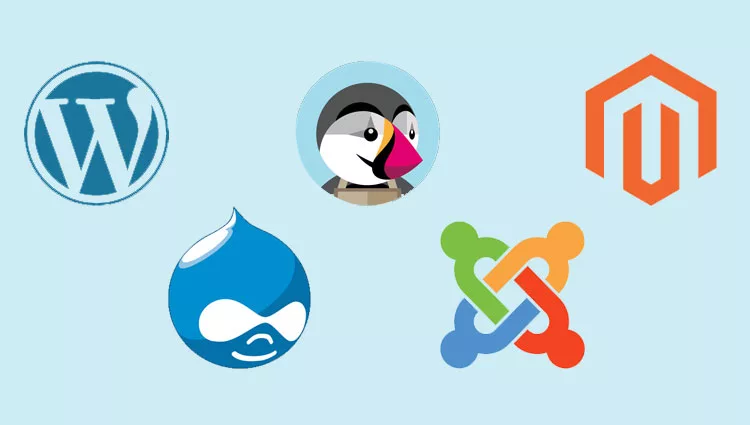Content Management Systems allow users to make a website without knowing how to code. By using a CMS, you can easily update, change or delete any image, text, video, or audio from your website.
There are tons of content management software out there and you can use any one based on your website’s needs. The top options include WordPress, Drupal, Joomla, Magento, and PrestaShop. Each CMS has its own function and has their specialty.
In this blog, we’ll be comparing WordPress vs Drupal vs Joomla vs Magento vs Prestashop. Hopefully, you’ll be able to find the best CMS based on your preference.
Overview of WordPress vs Drupal vs PrestaShop vs Joomla vs Magento
| CMS | WordPress | Drupal | Joomla | Magento | PrestaShop |
|---|---|---|---|---|---|
| Software | Open Source (Free) | Open Source (Free) | Open Source (Free) | Open Source (Free) | Open Source (Free) |
| CMS Market Share | 63.5% | 2.6% | 3.9% | 1.2% | 0.9% |
| Installation Process | One-click installation/5 Minute manual installation process. | One-click installation/10 Minute manual installation process. | One-click installation/10 Minute manual installation process. | One-click installation/10 Minute manual installation process. | One-click installation/15-minute manual installation process. |
| Ease of Use | No coding knowledge is required. | Requires coding skills. | Somewhat beginner friendly. | Requires coding skills. | Basic coding knowledge is needed. |
| Themes & Templates | 7,000+ free themes & 11,000+ Premium themes at ThemeForest. | 2,900+ free themes & 500+ Drupal paid themes on ThemeForest. | No free themes. 1,100+ paid themes on ThemeForest. | 10+ Megento official themes & 600+ Premium Magento themes on ThemeForest. | 3,200+ official PrestaShop themes & 500+ Premium themes. |
| Plugins & Extensions | 56,884+ free official plugins. | 45,861+ Drupal Module at the Official store. | 8,000+ free & paid themes. | 3,145+ official Magento themes. | 4,150+ official PrestaShop Modules. |
| Big Websites Using CMS | Sonymusic, BBC America, The New York Times. | NASA, White House, Australian Government, NCAA. | Harvard University, The Hill, The Fashion Spot. | SIGMA, Nike, Land Rover, cox & cox. | Monsieur Chaussure, KliknKlik, Sumo Lounge. |
Cost – WordPress vs Drupal vs Joomla vs Magento vs PrestaShop
Each CMS has its specialty. Based on the type of website you want to make, your choice of CMS will change drastically. To make your website on any of these CMS, all you need to do is get a domain name and web hosting.
- Domain Name: It is also called a website name. It refers to the address of a website on the internet. It costs somewhere around $5 – $15.
- Web Hosting: Web hosting is a space on the internet where you will store your web pages, images, and other audio-video content as well. Good web hosting platforms charge $0.5 per month for their services.
As you know all these CMS are free, but you may have to bear some additional costs apart from Domain and web hosting. There are free but you have to spend an extra amount for adding additional plugins, modules, or design templates to your core features. If you want to enhance the functionality of your website, then you should purchase Extensions, Plugins, and themes from any CMS platform.
So if you want to increase your website functionality, thus you should subscribe to any of these plans:
- WordPress plugins: $0-$1,051
- Drupal Modules: $0-$100
- Joomla Extensions: $0-$70
- Magento Extensions: $0-$28,700
- Prestashop Addons: $0-$89
If you want to increase your website look, thus you should subscribe to any of these themes:
- WordPress themes: $0-$250
- Drupal themes: $0-$80
- Joomla themes: $0-$200
- Magento themes: $0-$399
- Prestashop themes: $0-$12000
If you use free plugins and themes then your bill will be= $15(for Domain name) + $6 ($0.5*12) (for Web hosting)= $21 per month (approx).
Complete Comparison of WordPress, Drupal, Joomla, Magento, and Prestashop
1. WordPress
WordPress is a vastly used CMS platform that helps you to make your website user-friendly. It makes the presentation of your website amazing as well as you can easily run this platform without knowing to code.
It is a beginner-friendly CMS platform because It contains lots of amazing inbuilt blogging features for users.
In addition, WordPress is an open-source that enables web developers to study the CMS code. Here you can easily develop your plugins and templates.
Advantages of WordPress:
- WordPress is a simple, flexible, and adaptable CMS platform. That offers its amazing content management services to businesses as well as individual web developers.
- It offers lots of plugins and themes to enhance the functionality as well as the overall performance of the website.
- It is an open-source CMS platform that has a great team of developers and support staff.
- Many beginners and professionals are using WordPress as CMS software.
- It provides lots of pre-installed plugins and templates free of cost and at affordable prices.
- You can easily access WordPress from anywhere and anytime.
- WordPress does not require any HTML or Text Editor to format pages, posts, and other changes.
- Search Engines love WordPress websites because WordPress contains clean and simple codes.
- It offers mobile responsive blog formats to make your website mobile responsive.
- WordPress has a 63.5% share of the CMS market.
Disadvantages of WordPress:
- After using WordPress, web developers, and businesses are facing security and website vulnerabilities.
- WordPress’ page speed is slow and this platform is not as smooth as you think.
- This platform can easily create simple websites. But many people are facing coding-related issues if they try to build a complex website.
2. Drupal
Drupal is an open-source CMS that helps you to enhance the digital experience of visitors. It contains lots of features related to performance enhancement, content authoring, and excellent security as well.
This platform is commonly used by educational institutions, NGOs, Businesses, and Government institutions.
Advantages of Drupal:
- Drupal offers the best customization features for a wide variety of content types.
- It enables enterprise-level security by offering regular patches.
- Additionally, it offers many custom features related to modules and themes.
- Drupal offers tons of free Modules.
- It is the best suitable for high-traffic spikes.
- Drupal provides neat code and compelling modules.
- It offers a professional online community and plenty of additional functions.
- It has in-built multilingual functionality and high scalability features.
Disadvantages of Drupal:
- Without having good coding skills, you do not access it.
- Many users are facing Plugin compatibility issues.
- Sometimes it creates website speed issues.
3. Joomla
Joomla is one of the finest CMS which helps users to create websites with its powerful online applications. It can easily run any type of website.
Advantages of Joomla:
- It is an easy-to-use CMS platform and you can easily install it from the internet.
- Joomla offers lots of Plugins and templates.
- It provides amazing community support to increase the users’ utility.
- This is a free open-source platform.
- Many government applications and organizational websites are using this platform including Harvard University.
- It is a user-friendly CMS platform.
- It offers lots of templates and themes to its users.
- You can easily migrate the Joomla website to any server.
- It provides one-click updates as well as upgrade options to its users.
Disadvantages of Joomla:
- Joomla is more complex than WordPress.
- Sometimes it creates Plugins and backward compatibility issues.
- It contains fewer plugins and Extensions.
4. Magento
Magento is an open-source CMS software that is commonly used by enterprise-level businesses and big tech firms. It requires knowledge of coding, thus you can not run it without having a good knowledge of coding.
It offers lots of amazing tools related to SEO, and digital marketing. In addition, it provides control over the design, content, and functionality.
Advantages of Magento:
- It is an open-source CMS solution that provides amazing eCommerce features, such as SEO, functionality, marketing suite, catalog, website, and order management as well.
- It offers advanced testing capabilities to its users.
- It is a highly scalable and mobile-friendly CMS platform.
- It supports third-party integrations.
- It provides amazing community support.
- Magento is a highly functional and global platform.
- Its open-source code helps users to add advanced functionality and features as well.
- It offers direct access to multiple Magento stores.
- Additionally, it provides many inventory management features.
Disadvantages of Magneto:
- This platform is an expensive and time-consuming CMS solution.
- It charges the cost of ownership from users.
- This platform provides bed product support.
5. Prestashop
Prestashop is one of the best open-source eCommerce website development platforms that enables you to create and manage online businesses. It contains a fantastic platform interface, thus you can easily manage your eCommerce website.
It offers lots of advanced features, such as advanced backup schemes, easy accessibility, and high reliability. So, you can easily enhance your website credibility as well as overall performance.
Advantages of Prestashop:
- You can easily install this CMS platform.
- Prestashop is commonly used by eCommerce websites and is a budget-friendly solution.
- It provides easy customization and administrative features.
- It also provides demographic assistance.
- It also provides secure payment options and it
- If you have less knowledge of coding, you can easily run Prestashop.
- It contains international shipping and promotional tools.
- In addition, it offers lots of features related to SEO, email follow-up automation, catalog as well as site management.
Disadvantages of Prestashop:
- It provides limited scalability to the users.
- It offers lots of unprofessional designs.
- Prestashop is very expensive for eCommerce businesses.
Conclusion
Here is a summary of above written article.
- WordPress is commonly used by beginners or non-tech users to create and run a simple website. WordPress provides tons of free or paid plugins to enhance the capabilities of users. It is a user-friendly platform and any user can easily manage its functions.
- Drupal is an advanced CMS platform that is the best platform for users who have good knowledge of coding, like HTML, PHP, etc. It is one of the best website development platforms and is commonly used by big enterprises, news websites as well as commercial portals.
- Joomla contains a market share of 3.9% and is commonly used by database-driven websites. It helps you to build websites and powerful online applications.
- Magento is a popular CMS software and requires good knowledge of coding. It is generally used by big enterprises as well as big tech companies.
- Prestashop is an easy-to-use CMS platform that enables you to create and manage online businesses. If you don’t have good knowledge of coding, you can use this platform to manage your business website.





